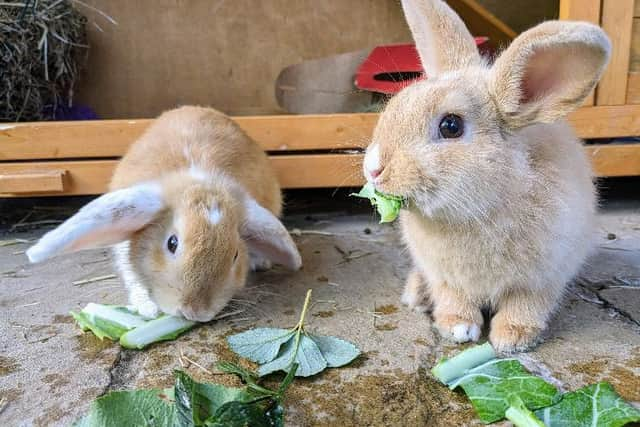Rabbits and rodents: RSPCA 'overwhelmed' by unwanted bunnies, rats and mice - as cost of living crisis bites
and live on Freeview channel 276
The RSPCA is struggling to find homes for an influx of rabbits and rodents, amid a perfect storm created by uninformed owners of pandemic pets letting them breed out of control - and the cost of living crisis.
Last year there was a huge 48% rise in the numbers of rabbits taken in by the charity, with 1,090 arriving at animal centres, and 1,942 rescued by the charity. This year - to the end of July - an additional 553 rabbits arrived at its centres, while 153 wild rabbits were brought in to its four wildlife centres.
Advertisement
Hide AdAdvertisement
Hide AdMany RSPCA centres are now full to capacity and cannot accommodate any more rabbits, the charity says. On top of this, they are now struggling to find people who can take one in - with the numbers of rabbits successfully rehomed falling 23% between 2019 and 2022.
It's not just rabbits either, with the numbers of popular pet rodents - including guinea pigs, rats, and mice - either surrendered to animal centres or "cruelly abandoned" also swelling. Almost as many guinea pigs have been handed in in the year to August as all of last year, which marked a 77% rise on the previous year.


For some of the more divisive pets, the spike was even more stark. Last year saw the number of domestic rats coming through the RSPCA's doors increase 193% - 191% for mice - from 2021.
For all species, the problem was all-too-often people buying opposite sex pairs, sometimes unknowingly, and a lack of awareness as to just how quickly they can breed.
Advertisement
Hide AdAdvertisement
Hide AdDr Jane Tyson, the RSPCA’s small animals welfare expert, said all of the popular pets can reproduce at a very young age, and many people don’t realise pets like rabbits can get pregnant again within hours of giving birth.
"Unsuspecting owners can quickly find themselves becoming overwhelmed with animals," she said. "That is why it is important to correctly sex rabbits and get them neutered at an appropriate age."
She urged anyone unsure of the sex of their rabbits to talk to their vet, and discuss neutering with them too.
“Our centres are full with unwanted rabbits as we have had a significant increase in our intake over the last year or two. For anyone who’s thinking about bringing rabbits into their lives, or are looking for a friend for their own rabbit, we’d encourage them to get in touch with their local RSPCA rescue centre and see if they can offer a loving home to some of our rabbits.”
Advertisement
Hide AdAdvertisement
Hide AdDr Tyson said that pet ownership rose significantly during the pandemic, but a combination of people not realising animals like guinea pigs actually had complex needs, and pet owners being hard hit by the cost of living crisis, were taking a toll on animal welfare.
The RSPCA says it is seeing the impact on the frontline - with reports of abandoned animals soaring as owners resort to desperate measures.
The charity’s Animal Kindness Index found that a growing number of people are finding keeping pets more expensive, and are worried about the costs of feeding their animals - with 81% of pet owners saying it is more expensive to look after their pets.
To help support pet owners, the charity has committed £1.5million of extra funding to crisis measures, launching a new Cost of Living Hub, a dedicated telephone helpline, and helping supply pet food banks.
Advertisement
Hide AdAdvertisement
Hide AdThe RSPCA is also taking part in Guinea Pig Awareness Week, which runs from 25 to 29 September. This year's focus is 'rescue and rehome' and the charity has created free digital information packs for people considering adopting the loveable rodents.
Comment Guidelines
National World encourages reader discussion on our stories. User feedback, insights and back-and-forth exchanges add a rich layer of context to reporting. Please review our Community Guidelines before commenting.
